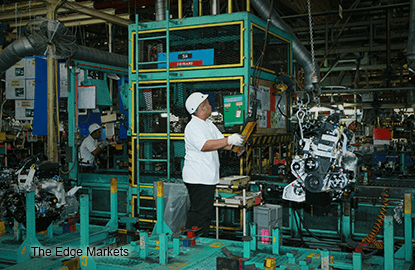
KUALA LUMPUR (April 1): Malaysia's manufacturing conditions continues to worsen in March, albeit at a softer pace, according to the headline Nikkei Malaysia Manufacturing Purchasing Managers Index (PMI), which came in at 48.4 in March compared to 47.8 in February.
"Production contracted at a rate little-changed from February's three-month record, subsequently leading to a further fall in input buying. New orders, on the other hand, declined at the weakest rate since May last year, bolstered by an increase in international demand," said Nikkei Inc and Markit Economics Ltd in a statement today.
The PMI is a composite single-figure indicator of manufacturing performance. It is derived from indicators for new orders, output, employment, suppliers' delivery times and stocks of purchases. Any figure greater than 50 indicates overall improvement of sector operating conditions, the statement read.
The PMI's rise to 48.4 from 47.8 in February signals a softer deterioration in operating conditions at Malaysian manufacturers. The latest reading also contributed to the highest quarterly average since the second quarter of 2015, it said.
New orders, however, contracted for the 13th successive month in March, and a number of panellists in its survey mentioned challenging market conditions and increased competition as factors behind the fall in new work.
"That said, the rate of decline eased to the weakest in 10 months, and data suggested that an increase in international demand helped to soften the overall fall in total new work intakes, as new export orders rose for the second month running," it said.
Meanwhile, production declined at a rate broadly unchanged from February's three-month record.
The rate of decrease was in line with the average observed over the current 12-month sequence of contraction, it said. "A number of the survey panel blamed unstable economic conditions and a fall in demand leading to a decline in output."
Consequently, manufacturers cut back on input buying. "As well as a reduction in sales, firms also mentioned the weak currency against the US dollar driving up prices as contributing to the fall in buying volumes," it said.
Meanwhile, employment growth resumed modestly in March.
"A reduction in orders combined with a rise in staff numbers consequently led to a further decline in unfinished work-in-hand, signalling spare capacity in the sector, it said.
The implementation of the goods and services tax and the weakness of the Malaysian ringgit against the US dollar pushing up raw material costs have led to further cost pressures, albeit the softest in eight months.
"Similarly, manufacturers increased their charges at a weaker rate," it added.